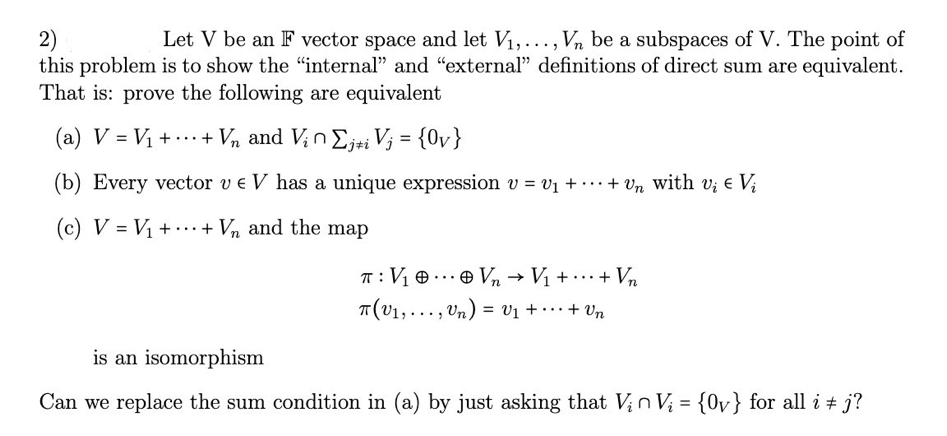2) Let V be an F vector space and let V₁,..., Vn be a subspaces of V. The point of this problem is to show the "internal" and "external" definitions of direct sum are equivalent. That is: prove the following are equivalent (a) V = V₁ ++ Vn and VinΣjti Vj = {Ov} (b) Every vector v eV has a unique expression v = v₁ + ... + Un with v₂ € Vi (c) V = V₁ +. + V₁ and the map T: V₁ V₂ → V₁ + ··· + Vn π(V₁,..., Un) = V₁ + ... + Vn is an isomorphism Can we replace the sum condition in (a) by just asking that Vin V₂ = {0v} for all i + j?
2) Let V be an F vector space and let V₁,..., Vn be a subspaces of V. The point of this problem is to show the "internal" and "external" definitions of direct sum are equivalent. That is: prove the following are equivalent (a) V = V₁ ++ Vn and VinΣjti Vj = {Ov} (b) Every vector v eV has a unique expression v = v₁ + ... + Un with v₂ € Vi (c) V = V₁ +. + V₁ and the map T: V₁ V₂ → V₁ + ··· + Vn π(V₁,..., Un) = V₁ + ... + Vn is an isomorphism Can we replace the sum condition in (a) by just asking that Vin V₂ = {0v} for all i + j?
Linear Algebra: A Modern Introduction
4th Edition
ISBN:9781285463247
Author:David Poole
Publisher:David Poole
Chapter6: Vector Spaces
Section6.2: Linear Independence, Basis, And Dimension
Problem 43EQ
Related questions
Question

Transcribed Image Text:2)
Let V be an F vector space and let V₁,..., Vn be a subspaces of V. The point of
this problem is to show the "internal" and "external" definitions of direct sum are equivalent.
That is: prove the following are equivalent
(a) V = V₁ ++ Vn and Vin Σjti Vj = {Ov}
(b) Every vector v € V has a unique expression v = v₁ + ... + Un with v¿ € Vi
(c) V = V₁ + + Vn and the map
T: V₁0 Vn → V₁ + ... + Vn
+ Vn
T(V₁,..., Un) = V₁ + ·
is an isomorphism
Can we replace the sum condition in (a) by just asking that Vin V₁ = {0v} for all i j?
Expert Solution
This question has been solved!
Explore an expertly crafted, step-by-step solution for a thorough understanding of key concepts.
Step by step
Solved in 2 steps

Recommended textbooks for you

Linear Algebra: A Modern Introduction
Algebra
ISBN:
9781285463247
Author:
David Poole
Publisher:
Cengage Learning

Elementary Linear Algebra (MindTap Course List)
Algebra
ISBN:
9781305658004
Author:
Ron Larson
Publisher:
Cengage Learning

Linear Algebra: A Modern Introduction
Algebra
ISBN:
9781285463247
Author:
David Poole
Publisher:
Cengage Learning

Elementary Linear Algebra (MindTap Course List)
Algebra
ISBN:
9781305658004
Author:
Ron Larson
Publisher:
Cengage Learning